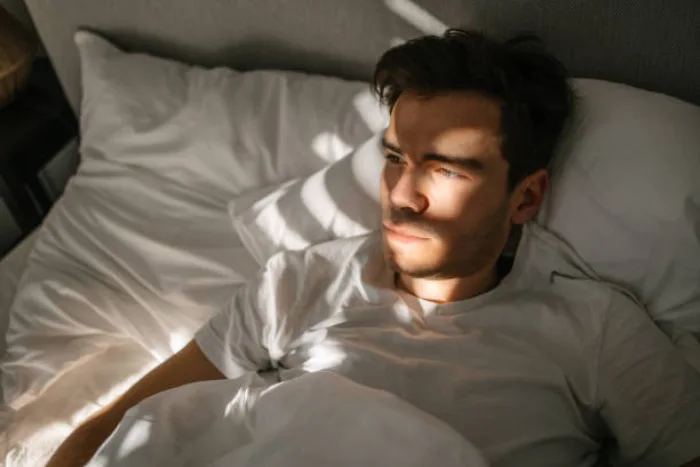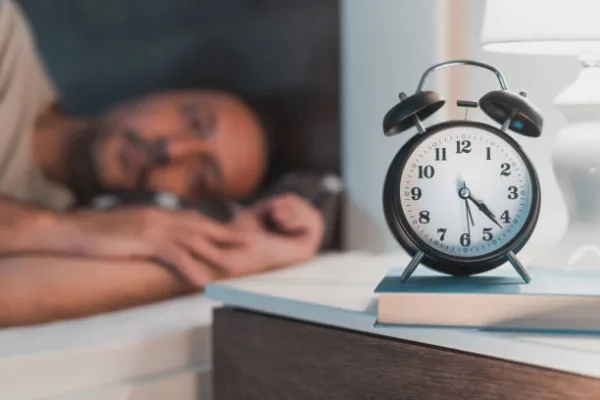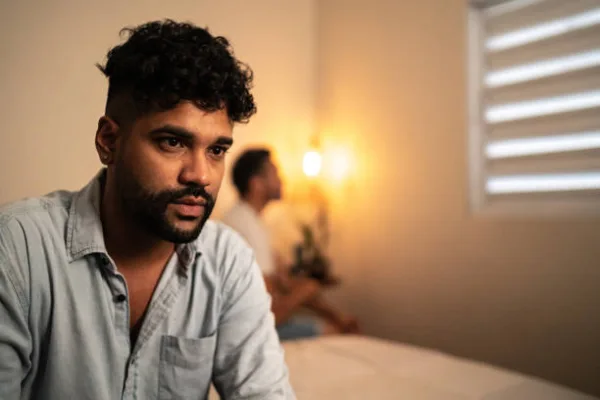Anxiety can cause sleep disorders, disrupting your ability to fall asleep or stay asleep throughout the night. Understanding how anxiety affects sleep is crucial in finding effective solutions.
One way anxiety can disrupt your sleep is through stress and arousal. When you’re anxious, your body releases stress hormones that keep you alert, making it difficult to relax and drift off into slumber. Also, anxiety can lead to sleep alterations, such as nightmares or vivid dreams that wake you up feeling unsettled.
Today we will explore the various ways in which anxiety can contribute to sleep disorders. By understanding these connections, you can find strategies to manage anxiety and improve sleep quality.
How Can Anxiety Cause Sleep Disorders: Possible Reasons
You may find yourself tossing and turning at night, unable to escape the clutches of sleeplessness, all because anxiety has taken hold of your mind and refuses to let go. Anxiety can be responsible for sleep disorders, and there are several possible reasons why.
- Stress and Arousal
- Sleep Alterations
- Panic Attacks
- Gad Insomnia
- Sleep Initiation
- Unhealthy Sleep Environment
- Depression
- Osa Comorbidity
- Sleep-Anxiety Cycle
Stress and Arousal
Stress and arousal can wreak havoc on our sleep, leaving us tossing and turning all night long. When we experience anxiety, our bodies go into a state of hyperarousal. This physiological stress response can make falling asleep and staying asleep difficult.
Anxiety triggers increased heart rate, breathing rate, muscle tension, and adrenaline levels, all promoting arousal during sleep. Also, chronic stress and anxiety can keep our bodies in constant arousal, disrupting our sleep-wake cycle.
This constant state of hyperarousal can lead to the development of sleep disorders such as insomnia or restless legs syndrome (RLS).
Sleep Alterations
Anxiety can lead to changes in sleep patterns, including difficulty falling asleep and staying asleep. Research has shown that individuals with generalized anxiety disorder often experience sleep maintenance insomnia, meaning they have trouble sleeping through the night.
Alternatively, those with panic disorder may struggle to initiate and maintain sleep. Note that no specific sleep architecture profile corresponds to any particular anxiety disorder. Sleep patterns can vary depending on the severity of the illness, the presence of other diagnoses, and the duration of the illness.
Sleep Initiation
When the mind is consumed by worry and racing thoughts, falling asleep can feel like chasing a fleeting dream. Anxiety, with its persistent negative thoughts and rumination, can make it difficult to initiate sleep. The mind becomes hyperactive, preventing relaxation and causing heightened arousal.
This state of mental tension can lead to frustration and anxiety about not being able to fall asleep quickly, which further disrupts the sleep initiation process.
Studies have shown that individuals with anxiety disorders often experience prolonged sleep latency, meaning it takes them longer to fall asleep than those without anxiety.
Sleep-Anxiety Cycle
The relationship between anxiety and sleep disturbances is complex. Anxiety-related sleep disorders can create a cycle where lack of sleep exacerbates anxiety symptoms, leading to further sleep problems and disruptions.
This cycle can be challenging to break for individuals’ mental health and quality of life. To combat this sleep disorder symptom, experts sometimes recommend medication to help reduce disturbances and improve sleep cycles.
You can buy clonazepam 2mg from an online pharmacy to help suppress anxiety and promote relaxation, improving your sleep cycle. But be sure to get advice from your doctor before taking any medication for anxiety-related sleep disorders.
Panic Attacks
The fear of experiencing another panic attack during sleep can also create a cycle of anxiety, perpetuating the problem. Nocturnal panic attacks, common in panic disorder, can occur during late stage 2 to early stage 3 sleep.
These episodes of intense fear can wake you up suddenly, leaving you feeling frightened and anxious. As a result, your ability to fall back asleep may be compromised, leading to further sleep disturbances.
Gad Insomnia
Having trouble staying asleep throughout the night can be a frustrating experience when you’re dealing with a generalized anxiety disorder (GAD). People with GAD often experience sleep maintenance insomnia, which means they struggle to stay asleep once they manage to fall asleep.
This can be attributed to the persistent negative thoughts, worry, and rumination associated with GAD, causing racing thoughts and emotional distress that disrupt sleep. It becomes a cycle where anxiety leads to difficulty falling and staying asleep, and lack of quality sleep exacerbates anxiety symptoms.
OSA Comorbidity
OSA, often coexisting with anxiety disorders, can lead to fragmented sleep and daytime fatigue, exacerbating depressive symptoms.
When someone suffers from obstructive sleep apnea, their breathing becomes partially or completely blocked during sleep, resulting in pauses in breathing that can last for seconds or even minutes.
These interruptions in breathing cause the person to wake up momentarily throughout the night, leading to fragmented sleep. As a result, they may experience excessive daytime fatigue and drowsiness.
Depression
Feeling overwhelmed and hopeless, you may be trapped in a never-ending cycle of sadness and despair. Depression, a common mental health disorder, is often associated with sleep disturbances and anxiety disorders.
The relationship between depression and sleep problems is bidirectional: depression can cause sleep disruptions, while sleep disturbances can exacerbate depressive symptoms. Depressed individuals frequently experience insomnia, with difficulty falling or staying asleep throughout the night.
Unhealthy Sleep Environment
An inadequate sleep environment can worsen sleep problems in individuals with anxiety, making it harder for them to relax and fall asleep. Noise, light, temperature, and uncomfortable sleeping conditions contribute to an unhealthy sleep environment that can exacerbate anxiety-related sleep disorders.
What triggers anxiety?
Physical or emotional abuse is considered one such trigger for anxiety problems. Experiences of physical or emotional abuse during childhood, adolescence, or adulthood can be significant triggers for developing and exacerbating anxiety problems.
Research suggests that going through stress and trauma at a young age can particularly contribute to developing anxiety disorders.
What does anxiety feel like?
Intense feelings of anxiety can be overwhelming and distressing. It often manifests as a sense of dread or fear of the worst. You may experience the world speeding up or slowing down, further heightening your unease. Also, you may believe that others can see your anxiety and scrutinize your every move.
The constant worry can consume your thoughts, making it difficult to stop worrying even if you want to. These anxiety symptoms can greatly impact sleep patterns, leading to sleep disorders.
Why does water help with anxiety?
When you’re dehydrated, it can lead to various physiological changes that contribute to feelings of anxiety. Drinking enough water can have a calming effect on your body and mind due to its natural ability to address dehydration’s impact on your overall well-being.
For example, studies have shown that dehydration can increase cortisol levels, a hormone associated with stress. Also, dehydration can affect the functioning of neurotransmitters in the brain that regulate mood and emotions.
By staying hydrated, you’re providing your body with the necessary fluids to function optimally. This includes maintaining proper blood flow and oxygen delivery to the brain, which can help alleviate anxiety symptoms.
Addressing Anxiety-Induced Sleep Disorders: Understand, Combat, and Seek Professional Help
Anxiety can indeed cause sleep disorders. The possible reasons include heightened stress and arousal levels, sleep alterations, panic attacks, GAD insomnia, and the sleep-anxiety cycle.
Understanding what triggers anxiety and recognizing its symptoms is crucial in addressing these sleep disturbances. It’s worth mentioning that water has been found to have a calming effect on anxiety due to its ability to reduce cortisol levels.
Also, seeking professional help and implementing healthy coping strategies can greatly alleviate anxiety-related sleep issues.




